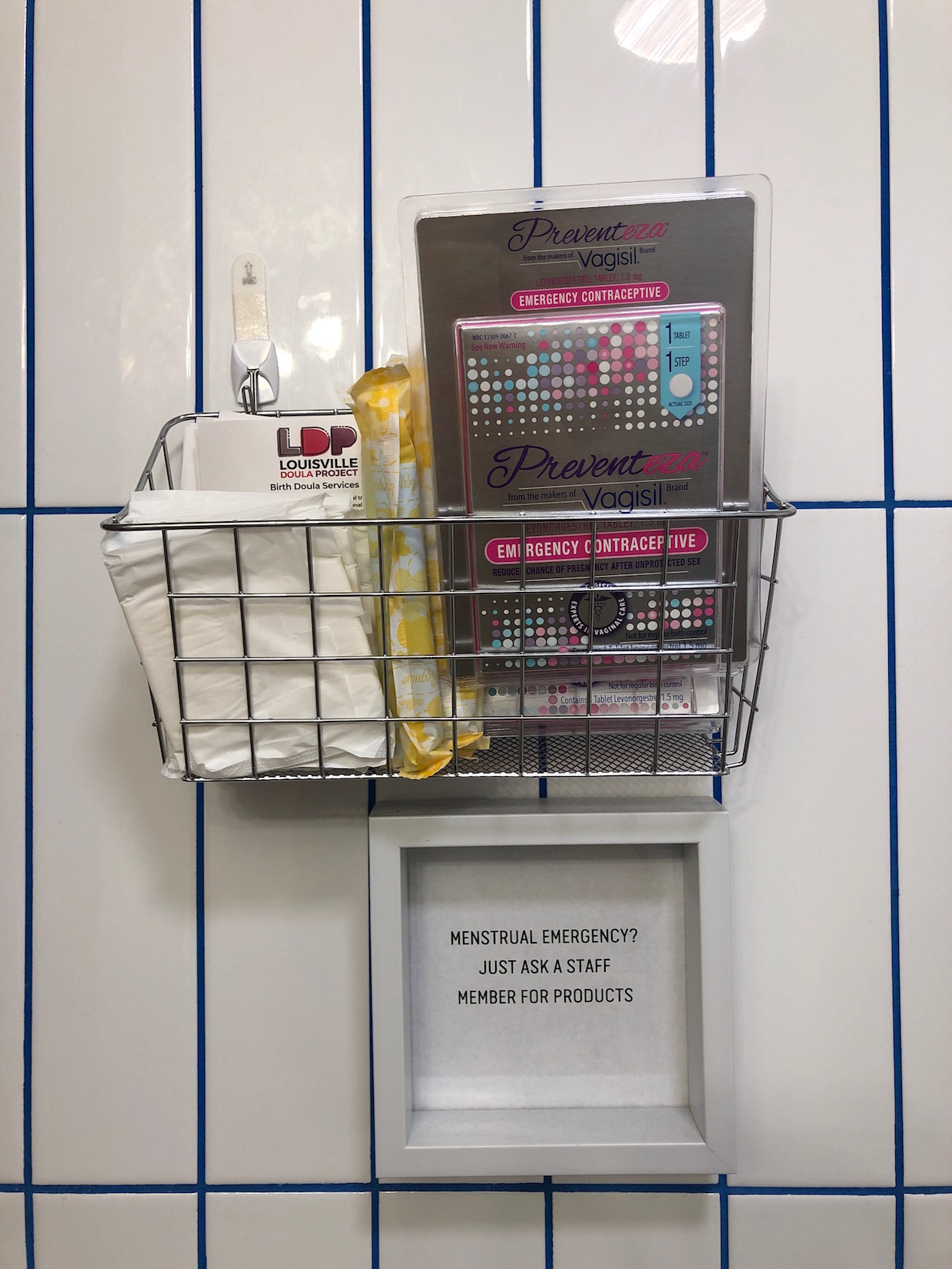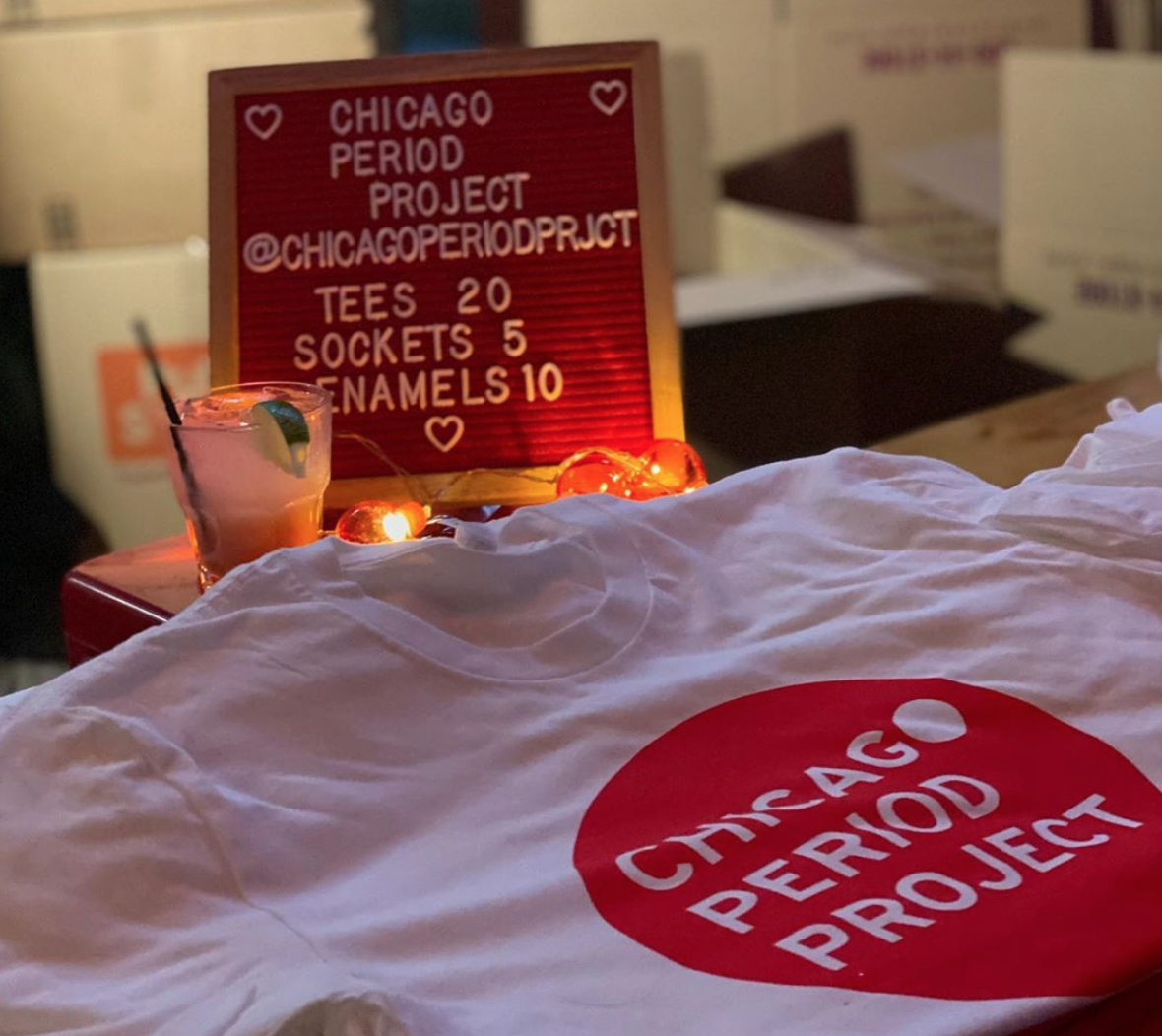
Menstrual and sexual health products at the Full Stop Shop cafe in Louisville, Kentucky. Photo courtesy of Sarah Hewett-Ball.
What would you define as a necessity for patrons of a coffee shop? Lids for to-go cups? Yes. Napkins? Of course. Toilet paper in the bathroom? Absolutely.
But what about tampons?
All over the world, the conversation surrounding access to menstrual products is evolving. States such as New York and Florida have added tampons and other products to their list of personal care items that are exempt from state sales tax, and the idea that menstrual products are a necessity, not a luxury, is becoming more widely accepted.
One in four people menstruates. If you consider the number of people working in or visiting a coffee shop through the course of any given day, the overwhelming odds are that some staff members or customers will need menstrual products on that day.
Although many businesses are already providing free access to items such as tampons or sanitary pads, the discussion surrounding menstrual products remains stigmatized. Other business owners may cite cost or personal responsibility as arguments — however unsubstantiated they may be — against the provision of menstrual products.
“Pads are like, 11 cents each, tampons 14 cents, and we’ve not spent more than $10 a month on menstrual products,” Sarah Hewett-Ball, a founding staff member at the Louisville, Kentucky, cafe Full Stop Shop, told Daily Coffee News. “We pay for cups, we pay for lids, and we don’t question the costs of these products. If we can afford these things, we can afford tampons.”
Along with menstrual products, Full Stop provides access to Plan B and sexual health products like condoms, free of charge. The bathrooms at Full Stop are single-use and gender-neutral. Often, if menstrual products are available, they are only in bathrooms designated for women, which can miss other populations who menstruate.
“One of our fantastic staff members, McClain Owens, works with a lot of activist groups in town,” Hewett-Ball said. “She caught word that Louisville Doula Project would provide Plan B at no cost to businesses willing to provide this to the public. McClain brought this up at our staff meeting and at a time where resources are being taken away from women, there was no question that we wanted to be on board.”
Most cities have at least one local organization that is actively working with businesses to help facilitate the provision of free tampons and menstrual products.
“Coffee shops and other public spaces play a big role in our everyday lives and should therefore use their platform to join in on the fight to end period poverty,” Ashley Novoa, who founded the Chicago Period Project (CPP) after the 2016 U.S. Presidential election, said. “I saw a video about period poverty and a light bulb went off and here we are over three years later.”
CPP’s goal is to provide access to menstrual products to homeless people and underserved communities, and Novoa noted that coffee shops play a pivotal role as meeting points in communities.
“Part of our mission is to provide supplies to people in need; it is not our job to define the word ‘need’ or specify who should get free supplies,” Novoa said. “Out of the kindness of our hearts, we just want to make sure that if you are menstruating at that moment, we are there with supplies. I think public spaces should follow suit and just provide the supplies without wondering who would take them and how many they’d take.”
Novoa encourages businesses to provide menstrual products not only because access is important, but because having tampons and pads in your bathroom normalizes a topic that is often ignored or uncomfortable for some.
“Unfortunately, there is still a huge taboo surrounding menstruation. We shouldn’t be ashamed of our periods; in fact, we should do as much as we can to break the stigmas of periods and normalize menstruation,” Novoa said. “Coffee shops and other public spaces play a big role in our everyday lives and should therefore use their platform to join in on the fight to end period poverty. Having free tampons in their spaces not only provides supplies for people that need them, but also normalizes periods by simply having them out in the open.”
Ashley Rodriguez
Ashley Rodriguez is a freelance writer and host of the podcast Boss Barista, a show with a focus on workplace equity and employee empowerment.
Comment
5 Comments
Comments are closed.







Why is this an article? What a bizarre and worthless thing to write about.
Homeless creeps camping in the bathroom, every coffeeshop owner’s dream
This is so Stoopid. If a coffee shop wants to provide an amenity, feminine hygiene or otherwise, that’s fine. But there’s no “should” involved. The only thing a coffee shop” should provide is good coffee.
Especially noteworthy are the “non-females” who drip blood. WTF ?
“Having free tampons in their spaces . . . normalizes periods by simply having them out in the open.”
Why not have patrons clean up right at the counter? Forcing them to use the bathroom at all is just wrong.
Next topic of discussion: How top California cities are normalizing poop by bringing it out into the open.